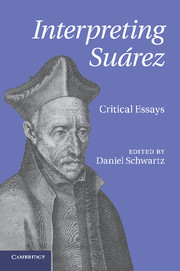Book contents
- Frontmatter
- Contents
- Notes on contributors
- Acknowledgements
- Abbreviations and method of citation
- Chapter 1 Introduction
- Chapter 2 Fundamentals in Suárez's metaphysics: transcendentals and categories
- Chapter 3 The reality of substantial form: Suárez, Metaphysical Disputations xv
- Chapter 4 Suárez on the ontology of relations
- Chapter 5 Suárez's cosmological argument for the existence of God
- Chapter 6 Action and freedom in Suárez's ethics
- Chapter 7 Obligation, rightness, and natural law: Suárez and some critics
- Chapter 8 Suárez on distributive justice
- Chapter 9 Suárez on just war
- Bibliography
- Index
Chapter 3 - The reality of substantial form: Suárez, Metaphysical Disputations xv
Published online by Cambridge University Press: 05 December 2011
- Frontmatter
- Contents
- Notes on contributors
- Acknowledgements
- Abbreviations and method of citation
- Chapter 1 Introduction
- Chapter 2 Fundamentals in Suárez's metaphysics: transcendentals and categories
- Chapter 3 The reality of substantial form: Suárez, Metaphysical Disputations xv
- Chapter 4 Suárez on the ontology of relations
- Chapter 5 Suárez's cosmological argument for the existence of God
- Chapter 6 Action and freedom in Suárez's ethics
- Chapter 7 Obligation, rightness, and natural law: Suárez and some critics
- Chapter 8 Suárez on distributive justice
- Chapter 9 Suárez on just war
- Bibliography
- Index
Summary
‘A philosophical being unknown to me.’ (Descartes)
Substantial forms: so much drivel?
When Francisco Suárez's contemporary René Descartes reports his lack of knowledge regarding substantial form, he does not mean to lament his own ignorance so much as to lay blame on the scholastic proponents of a doctrine he regards as dubious at best: he thinks, in fact, that there is nothing there to be known. In this he was only the first of a series of seventeenth- and eighteenth-century philosophers who sought to distance themselves from what came to be lampooned as a characteristically obscure scholastic doctrine. Locke, for instance, derided his predecessors for their ‘fruitless Enquiries after substantial Forms, wholly unintelligible, and whereof we have scarce so much as any obscure, or confused Conception in general’. If the doctrine of substantial forms is ‘wholly unintelligible’, as Locke contends, then it is hardly surprising that we have such an obscure and confused conception of it. Knowing a substantial form would be akin to having de re knowledge of a fastidious prime number or a bookish colour; such (putative) objects are incoherent, and so do not admit of even partial or confused conceptions.
Locke's haughty dismissal proved consequential, setting the stage for many of the English philosophers who followed him. Indeed, by the middle of the twentieth century, A. J. Ayer regarded himself justified in dismissing the entire topic of substance-based ontology without even pretending to offer a modestly informed argument against it. He thought it enough to remind his empiricist readers that the entire debate about substance could be set aside as ‘spurious’, deriving as it did from ‘the primitive superstition that to every name a single real entity must correspond’.
Keywords
- Type
- Chapter
- Information
- Interpreting SuárezCritical Essays, pp. 39 - 61Publisher: Cambridge University PressPrint publication year: 2011
- 4
- Cited by

